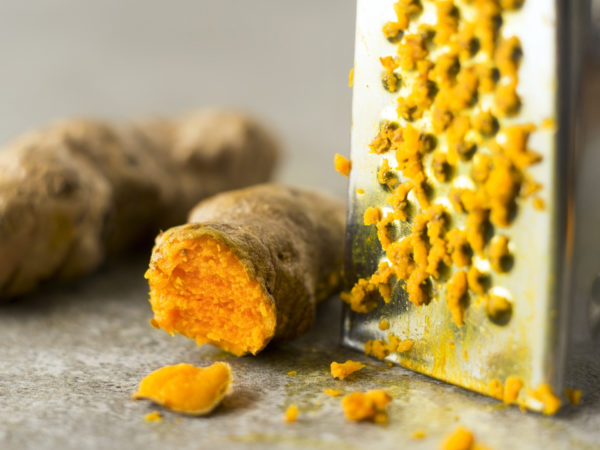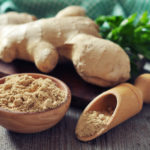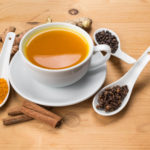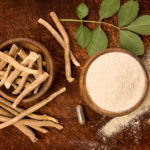Curcumin Or Turmeric?
I’m confused about curcumin and turmeric. I have the impression that curcumin, not turmeric, has been studied and that you can’t cook with curcumin but can get it as a supplement that costs about the same as turmeric supplements. If you’re going to take supplements which do you recommend, turmeric or curcumin?
Andrew Weil, M.D. | June 4, 2019

Turmeric is derived from the rhizomes (underground stems) of Curcuma longa, a tropical plant, related to ginger. It is responsible for the yellow color of Indian curry and American mustard. In addition to using turmeric as a culinary spice, it has been used traditionally in India as a disinfectant and treatment for laryngitis, bronchitis, and diabetes.
Turmeric is a very powerful natural anti-inflammatory agent and also has beneficial antioxidant properties. The responsible constituents are curcuminoids, of which curcumin is most prominent, making up between two to six percent of this spice. There has been a great deal of research on turmeric, most of it performed with isolated curcumin.
You can buy fresh turmeric rhizomes in many markets today and grate them into salads, stews, soups, and smoothies, and you can use powdered turmeric as a spice. Curcumin is only available in supplement form.
I frequently recommend supplemental turmeric, because I believe it has many health benefits and can help alleviate inflammatory disorders, including arthritis, tendonitis, and autoimmune conditions. My preference is for whole turmeric extracts, because I think the other curcuminoids add to the effects of curcumin.
Take 400 to 600 milligrams of turmeric extracts (available in tablets or capsules) three times per day or as directed on the product label. Look for products standardized for 95 percent curcuminoids. Neither curcumin nor turmeric taken orally is well absorbed unless taken with black pepper or piperine, a constituent of black pepper responsible for its pungency. When shopping for supplements, make sure that the one you choose contains black pepper extract or piperine. (If you’re cooking with turmeric, be sure to add some black pepper to the food.). Be patient when taking turmeric supplements: the full benefits may not be apparent for eight weeks.
Population studies have shown that India – where people consume turmeric regularly – has low rates of Alzheimer’s disease. Researchers have speculated that the anti-inflammatory effects of curcumin may be partly responsible. (Alzheimer’s begins as an inflammatory process in the brain.) So far, however, I’ve seen no scientific evidence of benefit from curcumin supplementation in Alzheimer’s patients. However, a study at UCLA published in 2018 found that taking a daily dose of curcumin helped prevent memory problems from worsening in 40 people between age 51 and 84. (None had mild Alzheimer’s disease or other forms of dementia). During the study, subjects took 90 mg of a curcumin supplement or a placebo twice a day for 18 months. Results showed a 28 percent improvement in memory tests among the people who took curcumin, and their brain Pet scans showed significant changes for the better in the amygdala and hypothalamus, the regions that control several memory functions. A larger study is planned.
Studies of turmeric and curcumin have shown the following benefits:
- Turmeric extract can help alleviate pain and improve function in people with osteoarthritis of the knee, and preliminary evidence suggests that curcumin may help reduce joint pain and swelling in people with rheumatoid arthritis.
- Laboratory studies suggest that curcumin acts as a weak phytoestrogen and seems to have cancer-protective effects.
- Lab studies have also shown that curcumin may help prevent or treat several types of cancer, including prostate, breast, skin, and colon cancer.
- Patients in remission from ulcerative colitis who take curcumin are significantly less likely to have the disease relapse.
Don’t use turmeric if you have gallstones or bile duct dysfunction. Pregnant women shouldn’t use it without their doctors’ approval. In rare cases, extended use can cause stomach upset or heartburn. Some evidence also suggests that curcumin can interfere with certain chemotherapy drugs used to treat breast cancer, so if you’re being treated for this disease, be sure to discuss the advisability of taking it with your physician. Finally, note that the piperine in many turmeric and curcumin supplements can slow the elimination of some prescription drugs, including phenytoin (Dilantin), propranolol (Inderal), and theophylline.
Andrew Weil, M.D.
Source:
Gary W. Small, “Memory and Brain Amyloid and Tau Effects of a Bioavailable Form of Curcumin in Non-Demented Adults: A Double-Blind, Placebo-Controlled 18-Month Trial.” American Journal of Geriatric Psychiatry, March 2018. doi: 10.1016/j.jagp.2017.10.010













